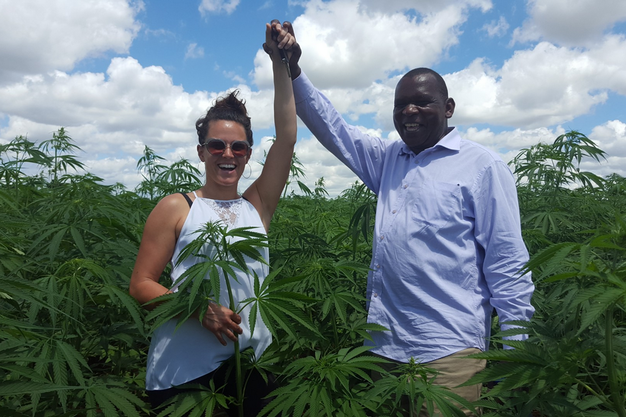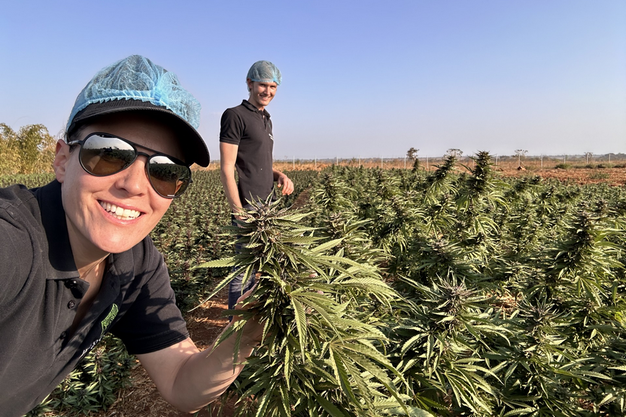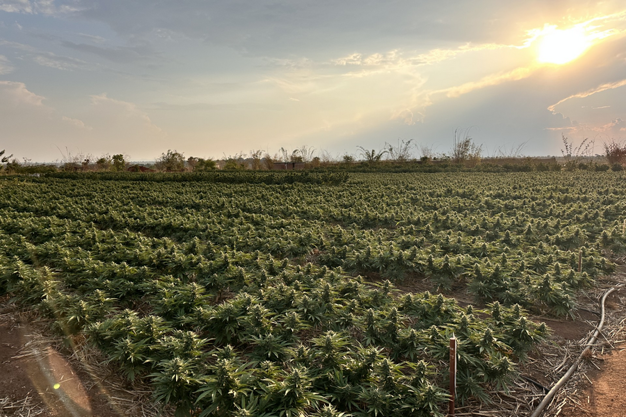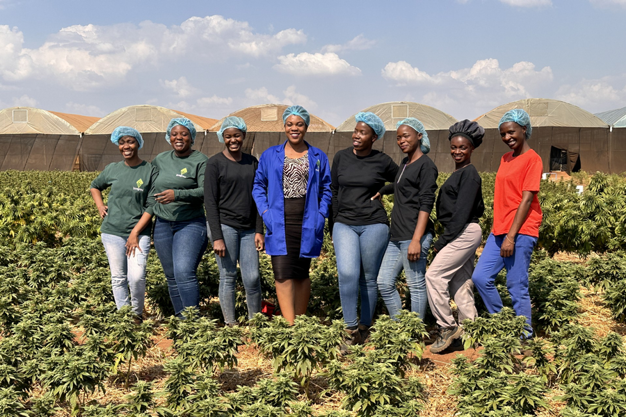After an eight-year wait involving lobbying, trials, research, and tedium, Invegrow became the first company awarded a cannabis cultivation license in Malawi in 2021. In 2013, when the arduous process began, Tanya Clarke, co-founder of the company, found an unlikely business partner to help her navigate the treacherous road to legalization: Malawian Secretary of Trade and Industry (and church elder) Nebert Nyirenda.
"He bought into the idea of medical cannabis, and he could talk to other institutions or religious entities that were causing bottlenecks in the path to legalization," Tanya explains. The years of research and negotiations that the two conducted together laid the foundations for Malawi's Cannabis Regulatory Authority as well as the Cannabis Act of 2020, which allows Invegrow to export its crop worldwide.
 Tanya Clarke and Nebert Niyrenda in 2016
Tanya Clarke and Nebert Niyrenda in 2016
Combining indoor and outdoor growing
Tanya says it has taken some time for the company to prove its capacity to produce, but she is confident they have cleared that hurdle. "We mainly export to Australia and Europe," she laughs. "The usual ones." The company uses a combination of greenhouse and open-field growing for its crop, utilizing organic solutions to address plant-related issues 90 percent of the time, Tanya says. "We mainly produce between March and December, following the seasons, and then in the rainy season, we switch to food and tree crops to help feed people and provide energy solutions to the population where only 12% is connected to mainline electricity."
Playing a role in the community
Invegrow, she explains, is not just a cannabis company. It is more of a horticultural business that employs more than a hundred people through its operations. Tanya finds the most rewarding part of Invegrow to be the social aspects of the business. The company grows maize for its employees to aid in food security, and has set up internal social programs to help cover school fees and funerals for loved ones. Sadly in Malawi, this is a frequent part of life.
On the cannabis side of things, Invegrow has started all of its cultivation from seeds that have been painstakingly phenohunted for years, not using any breeder cuts. This isn't meant as a dismissal of those who do; it's simply been a necessity as the company continues along its path. "We are always willing to work with clients or breeders who would like us to produce flowers from their cuts or even possibly register them. That's another thing we can do here—register strains through the research system that can be sold in SADC (Southern African Development Community) and globally."

Quicker strains for distinctive conditions
The fact that Invegrow grows outdoors means they prefer strains that take just 8 to 9 weeks to flower rather than the needier 12-14 week flowering time, typical of the local sativa varieties.
"We push the Malawian strains we work with for biomass or extraction because they have really interesting chemical profiles. They're quite high in THCV and some other interesting cannabinoids. For the Malawi landrace, we get some very fluffy sativa flowers that are a defense mechanism against climatic conditions. The market for them will grow; it's just going to take a little time for the market to open up to the bag appeal of African sativas."
Tanya is thoughtful when reflecting on the past and what it might mean for the future. "We started in the industrial hemp space, then pivoted into CBD while also keeping the industrial hemp side of things going. We still produce hemp foods on-site; it's something we're very passionate about. Then, when we got the medical cannabis license, we had to justify the investment we had made into greenhouses and drying chambers, and that was obviously going to come from THC-dominant medical cannabis flower."
 Some of Invegrow's outdoor crop
Some of Invegrow's outdoor crop
A variety of uses for the crop
Tanya explains that Invegrow has many uses for the cannabis it produces. Vapes and medical-use cannabis are two aspects, considering recreational cannabis is still illegal in Malawi, but the company also has extraction facilities to create cannabis oils for the local market from smaller flowers and leftover trim from its processes.
 65% of Invegrow's employees are made up of women
65% of Invegrow's employees are made up of women
"It's going to be interesting to see what happens now that Germany is opening up its doors for all cannabis products," she says. "And I think there will always be a space for flowers—they're going to become cheaper and more of a commodity." That's something that will appeal to Invegrow, as a low-cost, high-quality producer of cannabis flowers that sells across Southern Africa as well as globally.
"I think of quality cannabis as something that is representative of a region or an area, something that has its own color or taste, something unique about it. So we always wonder: how can we produce cannabis that appeals to people, and that has the desired effect both medicinally and spiritually? The climate, the place it's grown—those have a big effect. That's what I pride Invegrow on."
For more information:
Invegrow
invegrow.com/
